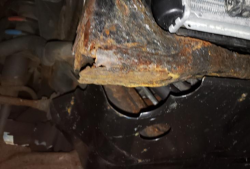— A Toyota 4Runner frame rust lawsuit has been dismissed after a 4Runner owner alleged rust and corrosion ruined his vehicle.
South Carolina plaintiff Gary Weinreich purchased a new fourth generation Toyota 4Runner Sport in June 2005, but in 2011 and 2013 mechanics said there was severe rust on the frame and undercarriage.
But the mechanics didn't say there were any safety issues.
In 2017, a Meineke shop indicated excessive frame corrosion and Weinreich learned Toyota had a customer support program for corrosion problems. However, the Toyota frame rust program didn't include 4Runners.
Then in 2018, Weinreich lost control of the 4Runner when the wheel vibrated, and after being towed to a garage it was determined the right front control arm had broken away from the frame due to corrosion and rust.
The plaintiff filed the Toyota 4Runner frame rust class action lawsuit by claiming 2005-2011 4Runners were defective if they were equipped with frames manufactured by the Dana Holding Corporation.
Toyota 4Runner Frame Rust Lawsuit Dismissed
The class action lawsuit was partly dismissed in 2019, including claims of negligent misrepresentation, negligence, strict liability and for injunctive relief.
For the warranty claims, the judge found the express warranties were “long-expired by 2018 and the implied warranties were disclaimed” after three years or 36,000 miles.
But the judge ruled the plaintiff adequately alleged the durational limits on the warranties could be potentially voided as “unconscionable” under South Carolina law.
The judge said the warranty claims could proceed to determine if Toyota "knew, at the time of sale, that the defect existed and would not manifest until the warranty expired, and that Toyota was on notice based on issues with the frames of prior car models.”
However, the judge warned "only in rare circumstances" should courts invalidate a contract on the basis of "unconscionability."
According to the judge, the plaintiffs must show:
- Toyota had notice of a defect at the time the plaintiffs purchased their 4Runners.
- Toyota knew the frame rust would manifest only after the warranty period.
- The resulting contract presented the plaintiffs with “no meaningful choice.”
- The terms therefore “unreasonably favored Defendant.”
Toyota argued issues with “Dana Frame Vehicles” could not have provided notice of alleged issues with the fourth generation 4Runners, and issues with the third generation 4Runners could not have provided notice of alleged issues with the fourth generation 4Runners.
Toyota argued the 4Runners with Dana frames “could not possibly put [Defendants] on notice of a corrosion defect with the 4Runner because the frames were made by different suppliers on different production lines in different countries resulting in different levels of zinc phosphate coverage.”
The Dana frame vehicles were were built in North America, and due to a process deficiency the frames lacked adequate zinc phosphate which resulted in premature corrosion.
But Dana did not supply the frames for vehicles produced in Japan and imported into the U.S., such as the plaintiffs’ 4Runners.
The judge also referenced a petition to investigate 4Runner frame rust submitted by Weinreich to the National Highway Traffic Safety Administration.
NHTSA rejected Weinreich’s defect petition for 4Runners because the Dana frame rust issue did not affect the frames of imported vehicles.
“Both third and fourth-generation 4Runner Vehicles were built in Japan and are not equipped with frames manufactured by Dana.” — NHTSA
The judge dismissed the Toyota 4Runner frame rust lawsuit by ruling the Dana frames on certain third generation vehicles did not provide notice to Toyota of any alleged frame rust problems on fourth generation 4Runners.
The Toyota 4Runner frame rust lawsuit was filed in the U.S. District Court for the District of South Carolina (Charleston Division): Gary Weinreich, et al., v. Toyota Motor Sales, et al.
The plaintiff is represented by the Bell Legal Group.

